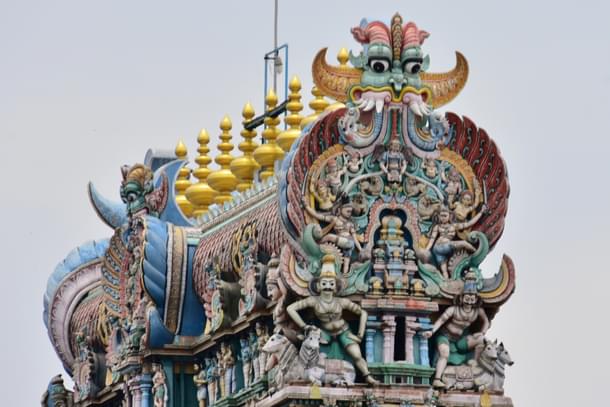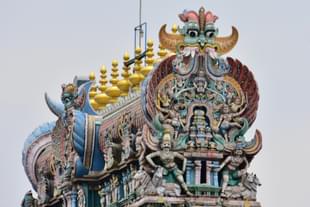Tamil Nadu
Madras HC Verdict: Why 30 January 2024 Was A Landmark Day For Hindus Of Tamil Nadu
Aravindan Neelakandan
Jan 31, 2024, 03:17 PM | Updated Feb 01, 2024, 01:09 PM IST
Save & read from anywhere!
Bookmark stories for easy access on any device or the Swarajya app.


The Madurai bench of the Madras High Court has directed the Hindu Religious and Charitable Endowments (HR&CE) Department authorities to install boards in all temples indicating that 'non-Hindus’ would not be allowed beyond the flag-pole or the kodimaram of the temple.
The honourable judge, Justice S Srimathy in her ruling said: "The respondents are directed not to allow the non-Hindus who do not believe in Hindu religion."
The ruling has the following five highlights:
1. The respondents (ie, HR&CE) are directed to install boards indicating that “non-Hindus are not allowed inside temple after kodimaram” in the entrance of the temples, near kodimaram and at prominent places in the temple.
2. The respondents are directed not to allow the non-Hindus who do not believe in Hindu religion.
3. If any non-Hindu claims to visit particular deity in the temple, then the respondents shall obtain undertaking from the said non-Hindu that he is having faith in the deity and he would follow the customs and practices of Hindu religion, and also abide by the temple customs and on such undertaking the said non-Hindu may be allowed to visit the temple.
4. Whenever a non-Hindu is allowed based on the undertaking, the same shall be entered in the register which shall be maintained by the temple.
5. The respondents shall maintain the temple premises by strictly following the agamas, customs and practices of the temple.
The context of the case is important.
In mid-2023, a Muslim family, including several women in veils, bought tickets at the winch station to visit the Palani hilltop, which is part of the temple premises. Temple authorities tried to stop them and showed them the board which stated that non-Hindus were not allowed.
However, the Dravida Munnetra Kazhagam (DMK) government not only had the board removed but when challenged about its removal, stated in court that installing such boards around the temple and the hilltop where it is situated, might hurt the religious sentiments of visitors, who throng the area not only to visit the sanctum sanctorum of the temple but also to take in the view from the hill top.
This attitude of HR&CE was not a casual attempt by a government to cover up its mistake, it was an ideological manoeuvre. A well-designed first step in setting a precedent of opening the temples to all non-Hindus — particularly those of the proselytising religions. The reasoning would be that it was not only a place of worship but also a place of art, history etc, and hence they have the right to treat a temple like a museum and not as a sacred space.
In a way, this approach gels with the ideology of Dravidianist movement. One of the luminaries of the movement wanted Hindu gods and goddesses to be merely museum exhibits like the pagan deities of Europe.
The ruling of the Madras HC correctly criticised this attitude of HR&CE saying that while the body "is mandated to protect the Hindu religion, Hindu temples, its customs and practices", they are instead "having misplaced sympathy and misplaced worry on sentiments of Non-Hindus".
The learned judge further pointed out the larger picture of what is happening across the state to all the famous Hindu temples under HR&CE:
Even though the respondent deny the incident cited by the petitioner, there is a newspaper reporting wherein it is stated that group of persons belonging to other religion tried to enter the temple as tourists. It was also reported that in Arulmighu Brahadeeswarar Temple a group of persons belonging to other religion had treated the temple premises as picnic spot and had non vegetarian food inside the temple premises. Likewise recently on 11.01.2024 a newspaper had reported that a group of persons belonging to the other religion had entered the Arulmighu Meenakshi Sundareswarar Temple, Madurai with “their sacred book” near sanctum and sanctorum and was attempting to do their prayers before sanctum sanctorum. These incidents are absolutely interfering in the fundamental rights guaranteed to the Hindus under the constitution. The Hindus also have fundamental right to profess and practice their religion freely and propagate their religion without interfering in their way of practice.
The judgment delivered on 30 January 2024, refutes the tendency of self-styled secularists and progressives to take an exception and portray it as the rule. "All provisions may have exemption", the ruling points out "but the exemption cannot be made as main provision" and goes on to say:
The present case is one such case where the respondents are trying to make the exemption as a rule. The non-Hindus cannot be allowed inside the temple but if the faith is established by non-Hindus, then an exemption is granted to the said non-Hindu to become believer of Hindu faith.
The importance of this judgement cannot be overstated. It has come out at a crucial time in the religio-political war going on in the state.
There has been a concerted attempt to gradually de-Hinduise Hindu temples and portray them as symbols of a pseudo-Tamil identity that is sought to be foisted on the state.
For example, Seeman (originally Sebastian) used to sport Hindu symbols like vibhuti but claims them to be Tamil racial ethnic symbols. He systematically de-spiritualises Tamil spiritual life by claiming that all Hindu gods and goddesses Tamils worship are actually ancestors.
A few years ago, Congress MP Jyotimani Sennimalai claimed that Tamil worship was "strictly ancestral worship".
The final aim of such projects is to either turn Hindu temples into museums or change the character of the temples altogether.
It is the gradual playing out of this manoeuvre that the judgement has halted for now.
Judicial pronouncements are only one part of the overall resistance. Ultimately, what is needed is a mass Hindu awakening. There should be a ground-level surge in Hindu activism and organisation to ensure that HR&CE does not impose its favourite ideologies on Hindu sacred spaces.
You can download the entire judgement here.





